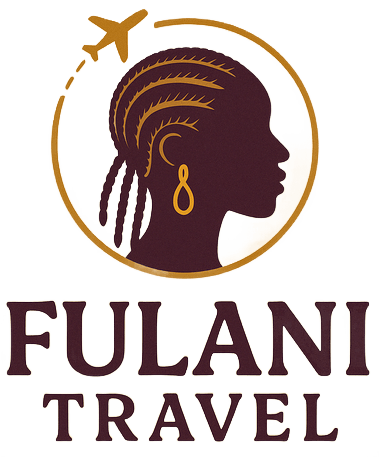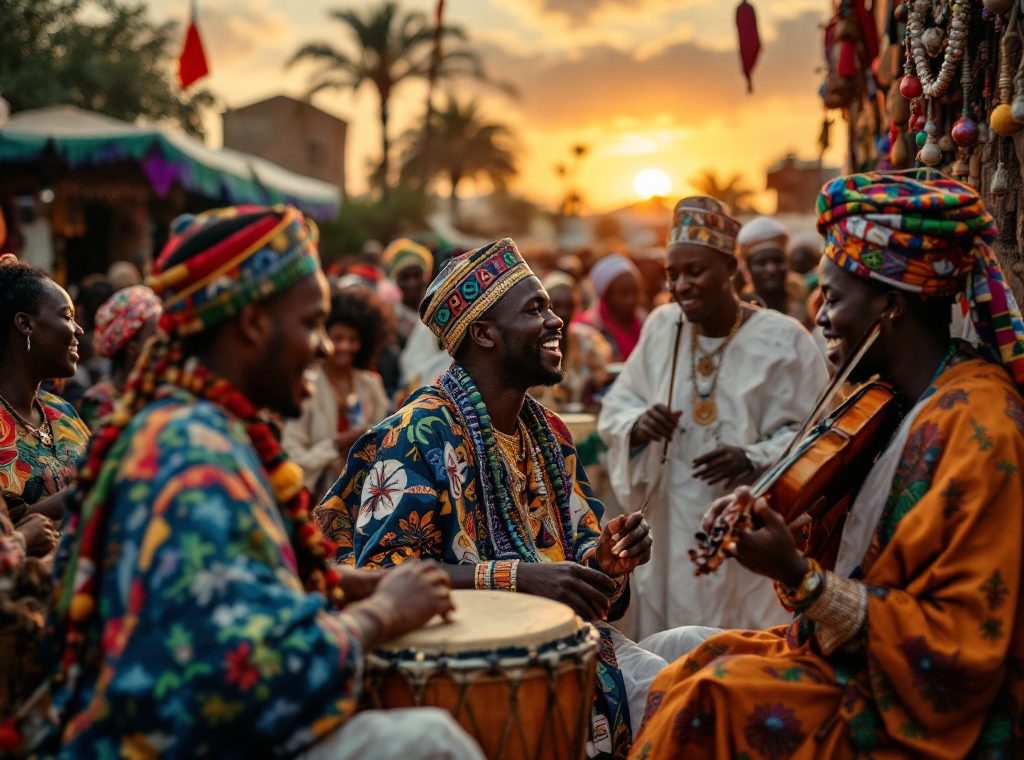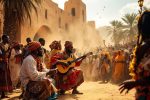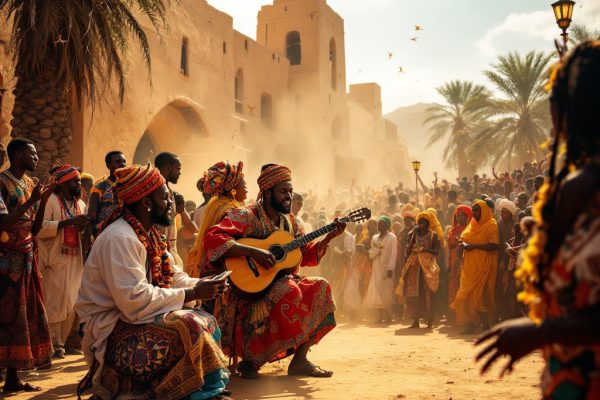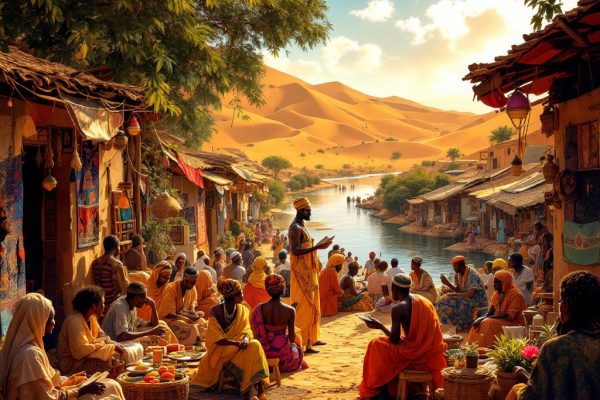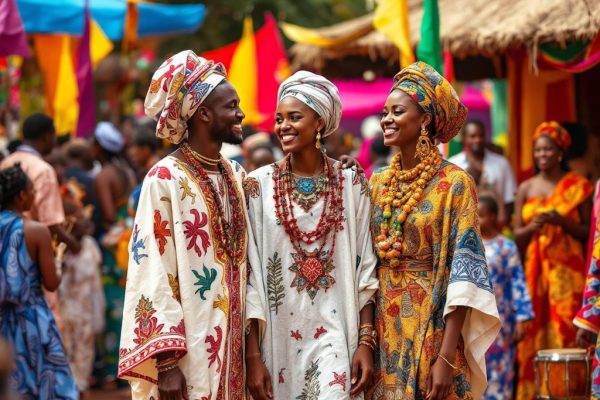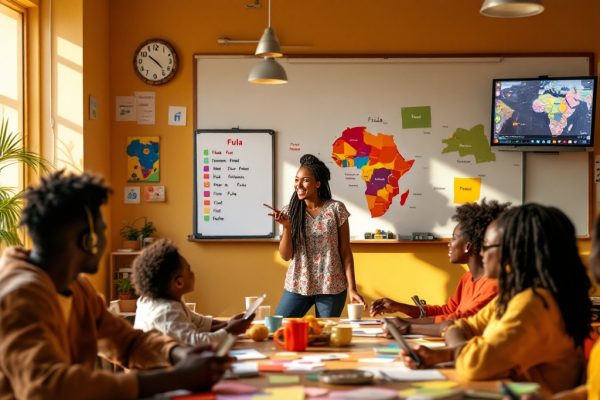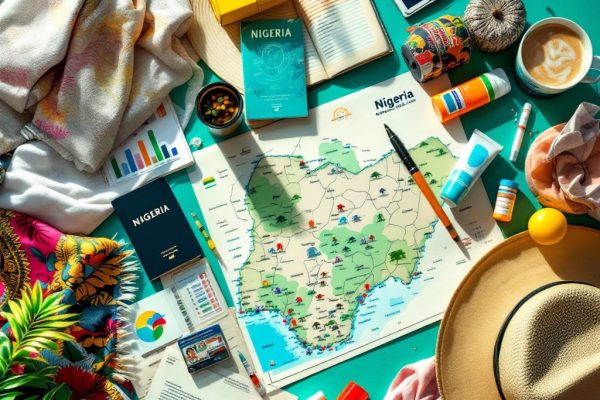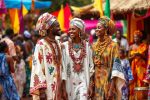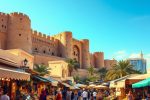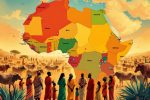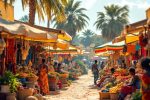Niger Culture and Traditions: Festivals, Music, and Everyday Life
Experience the vibrant cultural tapestry of Niger, a land where ancient traditions meet modern rhythms. From the rhythmic beats of Hausa Griot music to the haunting melodies of Tuareg blues, discover a diverse musical landscape shaped by unique instruments like the duma drum and imzad violin. Explore captivating festivals like Cure Salée and the Gerewol, celebrating nomadic heritage and courtship rituals. Delve into the everyday life of Niger, where Islamic traditions intertwine with unique customs, architecture, and handicrafts. Uncover the rich heritage and strong community values of Niger. Continue reading to embark on this cultural journey.
Important information
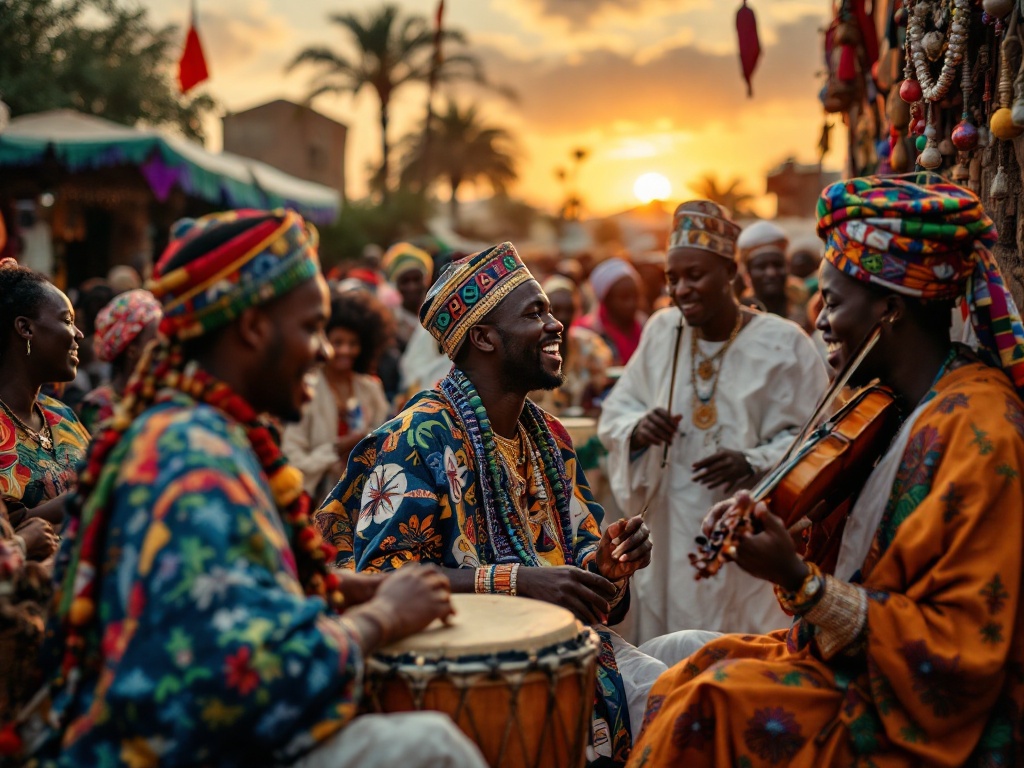
- Niger has a diverse cultural landscape shaped by various ethnic groups like the Hausa, Tuareg, and Wodaabe, each with unique traditions, languages, and customs.
- Islam is the dominant religion and significantly influences daily life, social customs, and cultural practices.
- Nigerien culture is rich in traditional festivals, music, and dance. These include the Cure Salée (celebrating nomadic life), Gerewol (a Wodaabe courtship ritual), and Tazarché (marking the harvest).
- Music is vital, ranging from traditional Hausa Griot music with instruments like the duma drum and molo lute to Tuareg blues, a blend of traditional and Western influences.
- Traditional architecture uses local, sustainable materials, while handicrafts like pottery, weaving, and leatherwork are essential to cultural preservation.
Niger Culture and Traditions: An Overview
Niger’s cultural tapestry is woven from the unique threads of its many ethnic groups, including the Hausa, Zarma, Tuareg, Fulani, Kanuri, and Toubou. Each group contributes distinct traditions, languages, and customs to this rich and diverse landscape. Islam, the dominant religion, profoundly influences daily life, shaping social customs and cultural practices. Nigerien culture also thrives on traditional festivals, music, dance, and storytelling—art forms that reflect the nation’s rich heritage and strong community values.
Diverse Ethnic Groups and Traditions
Niger’s diverse population creates a vibrant cultural landscape. The Hausa people contribute Griot music, often featuring instruments like the duma drum and molo lute. The Tuareg are known for their captivating love poetry, often accompanied by traditional instruments. The Wodaabe’s Gerewol is a unique courtship ritual with vibrant dances and elaborate beauty contests. The Cure Salée festival celebrates nomadic tribes and their livestock migrations. The Tazarché festival marks the end of harvest with music, dance, and local cuisine. Other groups, including the Zarma, Fula, Kanuri, Toubou, Diffa Arabs, and Gurma, further enrich this cultural tapestry with their own distinct traditions.
Festivals in Niger
Niger’s vibrant festivals are crucial expressions of cultural heritage and community identity. These gatherings showcase elaborate ceremonies, traditional dances, and music, uniting people in celebrations of harvests, religious holidays, and rites of passage. These events also reinforce social bonds and provide platforms for storytelling.
The Tazarché Festival
This festival marks the end of the harvest.
The Cure Salée Festival
This festival unites nomadic tribes as they commemorate livestock migration.
The Gerewol festival, a unique courtship ritual with vibrant dances and beauty contests, stands out as a particularly captivating event. Nigerien festivals also promote local crafts and preserve oral traditions, transmitting cultural values to younger generations and ensuring the continuity of Niger’s rich heritage.
Cure Salée Festival: A Celebration of Nomadic Tribes
Niger’s grandest traditional festival, Cure Salée, signals the end of the rainy season and draws nomadic Tuareg and Wodaabe tribes for a vibrant cultural exchange. The celebration bursts with traditional dances, music, thrilling horse races, and unique camel beauty contests. Cure Salée fosters social interaction, strengthening community bonds among the Saharan nomads while also attracting visitors from around the world eager to experience this authentic nomadic culture.
The Air Festival: Showcasing Berber Tribe Culture
Niger’s Air Festival, held in the Aïr Mountains, is a vibrant celebration of Berber culture. Showcasing traditional music, dance, and poetry, the festival is a powerful expression of Berber heritage and fosters community pride. The event attracts tourists, boosting the local economy. Importantly, it also promotes peace and security in the region, making it a vital cultural experience.
Islamic Festivals: Ramadan and Eid al Fitr
In Niger, Muslims observe Ramadan, a holy month of fasting, culminating in the joyous feast of Eid al-Fitr. These important Islamic festivals are integral to Nigerien culture and are widely celebrated across the nation.
Music of Niger: Traditional and Modern Influences
Niger’s music scene pulsates with a vibrant blend of ancient traditions and modern rhythms, reflecting the country’s diverse cultural heritage. Each ethnic group adds unique sonic textures to this rich tapestry. For example, the Hausa contribute the rhythmic beats of the duma drum and melodic strains of the molo lute, while the Tuareg are renowned for their haunting imzad violin. This traditional music forms the heart of Nigerien society, accompanying rituals, storytelling, and social gatherings.Tuareg music, often referred to as “desert blues,” possesses a particularly captivating allure. It seamlessly fuses traditional instruments with contemporary influences, often centered around evocative love poetry that expresses the heart of Tuareg culture.
Traditional Sounds
Niger’s traditional music is deeply rooted in its cultural heritage, with each ethnic group contributing unique instruments and styles. The Hausa music, characterized by the duma drum and molo lute, provides rhythmic energy, while the Tuareg’s imzad violin creates haunting melodies. This music accompanies rituals, storytelling, and social gatherings, forming the heart of Nigerien society.
Modern Rhythms
Niger’s music scene also embraces modern influences. The late 1990s saw the rise of Rap Nigerien, a unique genre blending local languages with a laid-back musical style and incorporating traditional elements. This innovative sound provides a powerful platform for young people to address pressing social issues.
Music festivals play a vital role in showcasing Niger’s diverse musical offerings. Events like the Festival in the Desert attract a global audience, fostering cultural exchange and boosting tourism while providing a stage for both traditional and modern artists to share their talents.
Traditional Music and Instruments
Niger’s diverse musical landscape reflects its vibrant ethnic tapestry. The Hausa, for instance, boast a rich tradition featuring instruments like the duma drum and the stringed molo, especially prominent in Griot music. Other groups contribute their own unique instruments and styles, creating a truly dynamic and varied soundscape.
Tuareg Blues and Love Poetry
Tuareg blues blends the sounds of their heritage with Western blues influences, featuring electric guitars and lyrics centered on love, loss, and social issues. This music is integral to Tuareg culture and has gained international recognition. Equally significant is their love poetry, often sung or spoken, characterized by deep romanticism and a casual delivery. This poetry plays a crucial role in courtship rituals and serves as a powerful medium for sharing emotional narratives.
Tuareg Blues
This unique genre blends traditional Tuareg music with Western blues, creating a captivating sound. It features electric guitars and lyrics that explore themes of love, loss, and social issues. Tuareg blues has become an integral part of their culture and has gained international recognition.
Tuareg Love Poetry
Known for its deep romanticism and casual delivery, Tuareg love poetry is often sung or spoken. This poetry plays a vital role in courtship rituals and provides a powerful medium for expressing emotional narratives.
Rap Nigerien: The Emergence of Modern Music
Nigerien rap, born in the late 1990s, blends the nation’s diverse languages with a distinctly relaxed sound, incorporating traditional musical styles. Unlike its traditional predecessors, this genre tackles contemporary issues like forced marriage, child labor, and corruption, providing a fresh platform for youth expression. Reflecting the daily realities of Nigerien life, this music has become a powerful sociocultural force, resonating deeply with younger generations.
Music Festivals and Their Impact
Niger’s music festivals are revitalizing the country’s soundscape, offering platforms for artists to shine. Attendees experience a vibrant blend of traditional and modern melodies, often featuring drums and string instruments integral to Niger’s musical legacy. Reflecting the rich culture of nomadic peoples, the music weaves tales of history, legends, and daily life. These gatherings strengthen communities by preserving traditions and celebrating Niger’s dynamic culture, connecting audiences to the past while embracing the future of Nigerien music. This fusion of traditional sounds and contemporary influences creates a vibrant and exciting musical landscape.
Everyday Life and Social Customs
Islam significantly influences daily life in Niger, shaping social customs and practices, from greetings and attire to routines. Courtship and marriage, steeped in tradition, often involve arranged marriages and customary ceremonies, although modern practices are becoming more common. Nigerien architecture demonstrates sustainability, using local materials and climate-adapted techniques to create functional and aesthetically pleasing structures. Handicrafts, including pottery, weaving, and leatherwork, are essential to Nigerien culture, showcasing artistic talent and preserving the nation’s heritage.
Influence of Islam on Daily Life
Islam is deeply ingrained in everyday life in Niger. The daily schedule revolves around prayer times, and dietary principles like halal guide food consumption. Social customs reflect Islamic values, with mosques acting as essential community hubs. Significant Islamic holidays, such as Ramadan and Eid al-Fitr, are key events in the Nigerien calendar, observed by the Muslim majority and profoundly influencing the nation’s culture.
Traditional Courtship and Marriage Practices
In Niger, courtship is a deeply communal process, involving families and communities. Marriage customs vary across diverse ethnic groups, each with unique rituals and ceremonies. The Wodaabe Gerewol festival exemplifies this, where men compete for wives through elaborate dances, showcasing a rich cultural tradition.
Traditional Architecture and Handcrafts
Nigerien artisans construct unique buildings using readily available materials such as mud, wood, and straw. These eco-friendly designs are showcased in structures like mosques and granaries. Handicrafts, including pottery, weaving, and leatherwork, are essential to Nigerien culture. These crafts frequently display unique regional patterns. For example, the Tuareg and Hausa people exhibit distinct styles. These artistic skills, passed down through generations, preserve Niger’s rich heritage.
